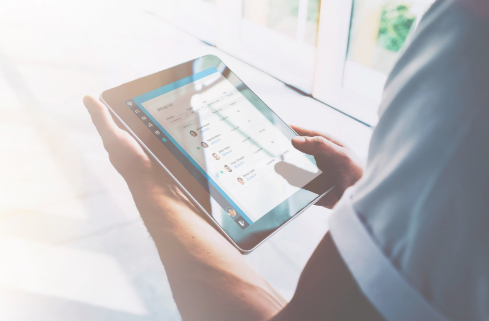Although most people think of fitness trackers or smartwatches when they hear the word “wearables”, there’s actually a wide range of wearable medical devices currently available on the market — some of which have significant potential for improving health outcomes and reducing costs to the healthcare system. Consumers are enthusiastically adopting these innovative technologies, with the wearable medical devices market expected to reach over $14 Billion USD by 2022( opens in a new window1). With CMS recently taking the first steps towards recognizing remote patient monitoring and the collection and analysis of health data for separate payment( opens in a new window2), the stage is set for empowered consumers and connected physicians to collaboratively leverage these technologies and the incredible amounts of clinical data they can provide.
One of the major areas of value to these medical grade wearables requires that analyzing and using the data is as easy, intuitive and clinically relevant as possible. While many manufacturers make their own web portal for their own single device, the future requires an independent ecosystem to provide a comprehensive overview of a variety of different health outcomes in one place. As more and more devices become available on the market going from one app to another for different readings is unsustainable from a patient, a clinical and a reimbursement standpoint. Moving forward, vendor-neutral devices that offer collaborated ecosystems such as iUGO Care’s platform is the way of the future for collecting data, generate potential savings and increasing revenue. iUGO Care offers a comprehensive platform for the big picture in remote monitoring that allows for patient measurement and reimbursement to take place on one, secure environment to better manage all aspects of care.
Current
Medical grade wearables are a special class intended for clinical use to improve chronic illness or specific ailments and must get FDA Class II certified, which requires rigorous clinical trials or independent testing to achieve( opens in a new window3). In comparison, most popular consumer fitness and activity tracking wearables are lifestyle devices that generally require a lesser or no FDA clearance, but still hold great promise as a tool to be used as part of a larger, clinically-significant program. There has been a multitude of clinical trials involving the ever-popular FitBit as a component, with diverse goals including reducing obesity, evaluating cancer patients’ fitness for chemotherapy, encouraging smoking cessation, and identifying patients at risk for surgical complications( opens in a new window4).
Glucose Monitoring Systems
The FDA approved the first continuous glucose monitoring system (CGM), the FreeStyle Libre Flash, late last year( opens in a new window5). The Libre Flash includes a water-resistant sensor that can be worn by the patient for up to 10 days, and allow glucose levels to be read by a simple wave of a mobile reader – even through clothing. This is not only a major quality of life improvement over daily finger sticks, but the data continuously gathered by the device can be presented to patients and caregivers through an app for easy identification of glucose trends and patterns. Type 1 diabetic patients using this technology reported a 38% reduction in hypoglycemia vs. standard blood glucose testing, while Type 2 diabetic patients saw an even higher reduction at 43%( opens in a new window6). In March of this year, the FDA also approved the first fully interoperable CGM system, the Dexcom G6, which can be used as part of an integrated system with other compatible medical devices such as automated insulin dosing systems, insulin pumps, or blood glucose meters.
Future
Wearable ECG/EKG Monitors
First introduced at CES 2015 as the world’s first wearable ECG/EKG monitor( opens in a new window8), QardioCore is designed for continuous heart health monitoring and uses an adjustable chest strap in combination with sensors to record clinically accurate measures for ECG, heart rate, respiratory rate, and skin temperature. QardioCore is currently only available outside of the U.S.( opens in a new window9), but will be available for sale in the U.S. once FDA clearance is received.
Diagnostic Contact Lenses
Wearable diagnostic contact lenses continue to be a hot topic among top tech companies and scientists, with Google and Novartis leading the charge in 2014( opens in a new window10) with a plan for creating a device that they hoped could monitor glucose levels and assist patients with eye problems. Although that particular project is currently stalled and the technology overall needs further work, advances continue to be made in this field with a number of notable companies including Apple, Sony, and Samsung reportedly working on their own related projects( opens in a new window11).
Asthma Monitoring
Health Care Originals, Inc. has a wearable in the works, ADAMM, that won the 2015/2015 Innovation World Cup( opens in a new window12) with its innovative technology for intelligent asthma monitoring. ADAMM uses a patch-type, flexible wearable to detect precursor symptoms of asthma such as cough counting, respiration, wheeze, and heart rate. ADAMM currently has over 3,000 devices already committed for clinical trials( opens in a new window13).
Reliq Health Technologies is a rapidly growing technology company focused on developing innovate remote patient monitoring, care collaboration and telemedicine solutions for Community-Based Healthcare. Our virtual care platform (iUGOCare.ca) uses a high tech, low touch approach to provide high-quality health care in the community setting while reducing the cost of care delivery. For more information contact us today.
By: Rachel Barker, VP of Operations
1 https://www.marketsandmarkets.com/Market-Reports/wearable-medical-device-market-81753973.html
3 https://www.biotricity.com/difference-clinical-wearables-fitness-wearables/
5 https://www.fda.gov/NewsEvents/Newsroom/PressAnnouncements/ucm577890.htm
6 https://www.freestylelibre.us/cgm-difference/cgm-reinvented.html
7 https://www.fda.gov/NewsEvents/Newsroom/PressAnnouncements/ucm602870.htm
8 https://www.macrumors.com/2017/01/03/ces-2017-qardiocore-ecg-monitor/
9 https://store-ca.getqardio.com/products/qardiocore
10 https://labiotech.eu/contact-lens-glucose-diabetes/
11 http://www.sciencemag.org/news/2018/01/these-smart-contacts-can-monitor-glucose-tears
12 http://www.innovationworldcup.com/finalist/adamm-by-intelligent-asthma-management/




